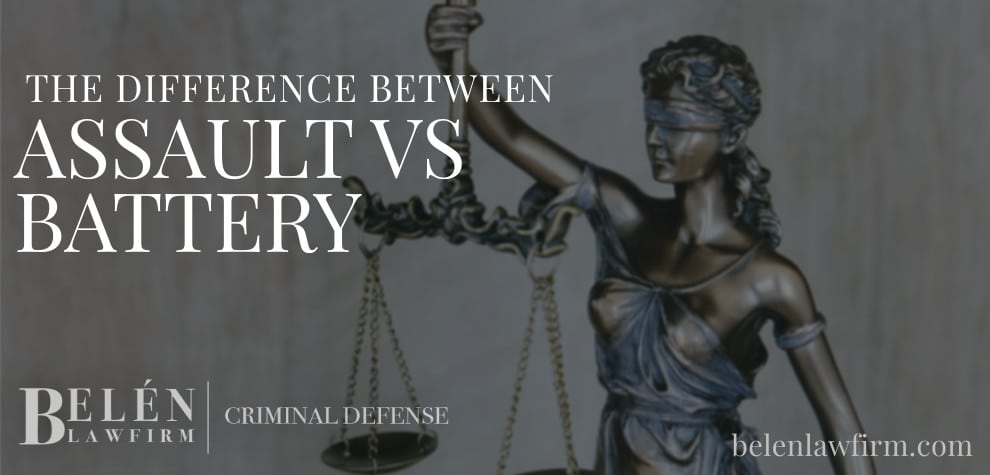Assault and battery are crimes paired together: the crime of threatening a person paired with the act of making physical contact with them. Arizona prosecutes both crimes very seriously. Both crimes involve threatening harm or actually causing harm to another person. What’s the difference between assault and battery? The laws surrounding assault and battery in Arizona can be complicated. So, it is important to hire an experienced defense attorney for your legal defense.
Assault vs Battery in Arizona
Courts generally consider assault less serious than battery. Arizona considers the three classes of assault misdemeanors, while battery (also known as aggravated assault in Arizona) is a felony.
In Arizona, you don’t actually need to physically harm someone to be guilty of assault. Some states even refer to assault as an “attempted battery”; therefore, assault criminalizes the threat of harm itself, rather than requiring that any actual harm occur. This charge falls under Arizona’s violent crimes charges.
On the other hand, battery (or aggravated assault) requires the accused to actually cause real harm to the victim. In many ways, battery is the completion of assault.
Therefore, assault is defined as an attempt or threat to injure another person, while battery occurs when there is actually harmful or offense contact with another person.
Because assault is the threat of harm and battery is the act of harming another person, these two crimes are often charged together.
Arizona Assault and Battery Laws
Typically we see assault and battery charged together. However, in the eyes of the law, these hold different weights, as Arizona considers the two to be different crimes.
Assault Charges in Phoenix
Arizona divides assault charges into three categories, all of which are misdemeanors. A conviction for misdemeanor assault requires the prosecution prove beyond a reasonable doubt that the defendant:
- Intentionally, knowingly, or recklessly caused any physical injury to another person
- Intentionally placed another person in reasonable apprehension of imminent physical injury
- Knowingly touched another person with the intent to injure, insult, or provoke that person
It is not necessary for the prosecution to prove that the defendant did all of these things. Being able to prove only one of these three things is enough to convict the defendant of assault.
For example, if you are in a bar and begin arguing with another patron and threaten to hit them while advancing with a raised fist, that would likely qualify as assault under Arizona assault laws, whether or not you actually hit them. In some instances, simply shoving someone during a heated moment provides grounds for assault, even though shoving them may not actually injure them.
The law is very slippery and malleable in this area, which is why it’s important to hire an experienced attorney who has argued violent crimes in front of a judge before.
All forms of simple assault are considered misdemeanors and do not have very heavy penalties. But, if you have been charged with assault in the last two years, you will be sentenced for the next highest class of offense. So, if you are convicted of Class 3 Assault but were convicted on the same charges 18 months before, you are now sentenced for a Class 2 Assault.
Arizona Assault Classes
The state of Arizona differentiates the classes of assault by the severity of the incident. The categories for simple misdemeanor assault in Arizona are as follows:
- Class 1 Assault: This is the most serious misdemeanor charge. It requires proof that you intentionally, recklessly, or knowingly caused physical injury. Therefore, Class 1 Assaults don’t typically come forth for simple threats. The maximum potential jail time is six months, with a fine of no more than $2500.
- Class 2 Assault: This form of assault requires proof that you intentionally placed another person in reasonable apprehension of imminent physical injury. The maximum potential jail time is four months and a fine of no more than $750.
- Class 3 Assault: This is the least serious assault charge. Arizona only requires the prosecution to prove that you touched another person with an intent to injure or insult, or provoke the other person. The alleged victim does not have to be injured, necessarily. The maximum potential jail time is 30 days with a fine of no more than $500.
Battery (Aggravated Assault) in Arizona
The main difference between assault and battery is the seriousness of the punishment. Arizona recognizes the term “battery” as being synonymous with aggravated assault. It carries the charges of Class 2 to Class 5 felonies. If you are convicted of aggravated assault as a dangerous offense, you will go to prison, even if it is your first offense. There are many different kinds of aggravated assault, and many of them are very serious. Assault with a Deadly Weapon, for instance, is a class 3 felony, as is Assault with a Dangerous Instrument, and Assault that causes physical injury. Arizona penalties for felonies are much harsher than those for misdemeanors.
Less severe forms of aggravated assault or battery exist. However, if the state finds you guilty of a more serious charge, even with no prior legal trouble, Arizona imposes a mandatory minimum prison sentence of 5 years, with no chance of parole.
Charges increase to aggravated assault when the defendant commits an assault in the following manner:
- Causes serious physical injury or substantial disfigurement to another person
- Uses a deadly weapon or dangerous instrument to intentionally place somebody in imminent fear of serious physical injury. This is another difference between assault and battery. Simple assault does not include a weapon of any kind. Any object potentially classified as a weapon appearing during an altercation between you and another person, potentially escalates your charges to aggravated assault with a deadly weapon.
- Commits an ordinary assault on a public servant, such as a police officer, teacher, prosecutor, hospital staff or prison guard.
Legal Defenses for Assault and Battery
The state of Arizona typically charges assault and battery together. This happens because the two normally appear together, in cases. Rarely is there an assault without a battery to follow. There are plenty of possible legal defenses for these crimes, including:
- Self-defense. Say someone takes a swing at you and you defend yourself. If you land a lucky punch and knock the other person unconscious, do you deserve to go to potentially go to prison for five years? Of course not.
- Defense of another person or personal property. If someone in a restaurant is harassing your girlfriend and you are only trying to make them stop, you could potentially end up with an assault or battery charge.
- You are not the right person to charge. Often, the police can hand out assault and battery charges to anyone involved in a group altercation. However, assault and battery are fact-centric charges, and oftentimes a good Arizona criminal defense attorney will be able to prove that though you might have been present, you did not commit the offense you have been charged with.
Contact Belen Olmedo Guerra if You’ve Been Charged for Assault or Battery in Phoenix
Belen Olmedo Guerra is an experienced defense attorney who has argued many felony cases at court and has extensive knowledge of violent crimes. If you or someone you know has been charged with assault and battery, contact the Belen Law Firm at 602-715-0908, or fill out a short form for a free and confidential consultation.




















